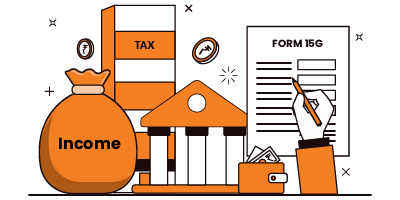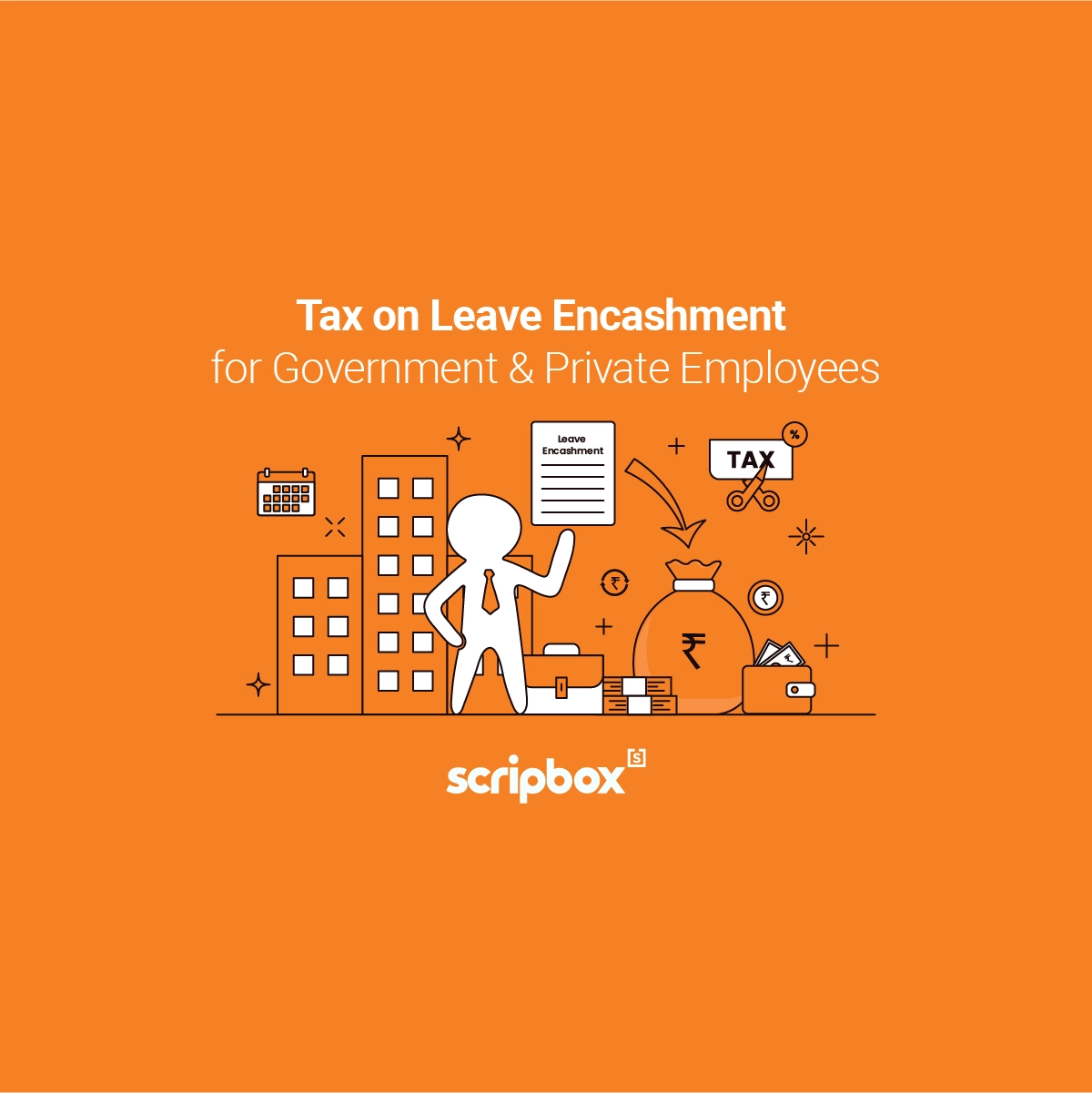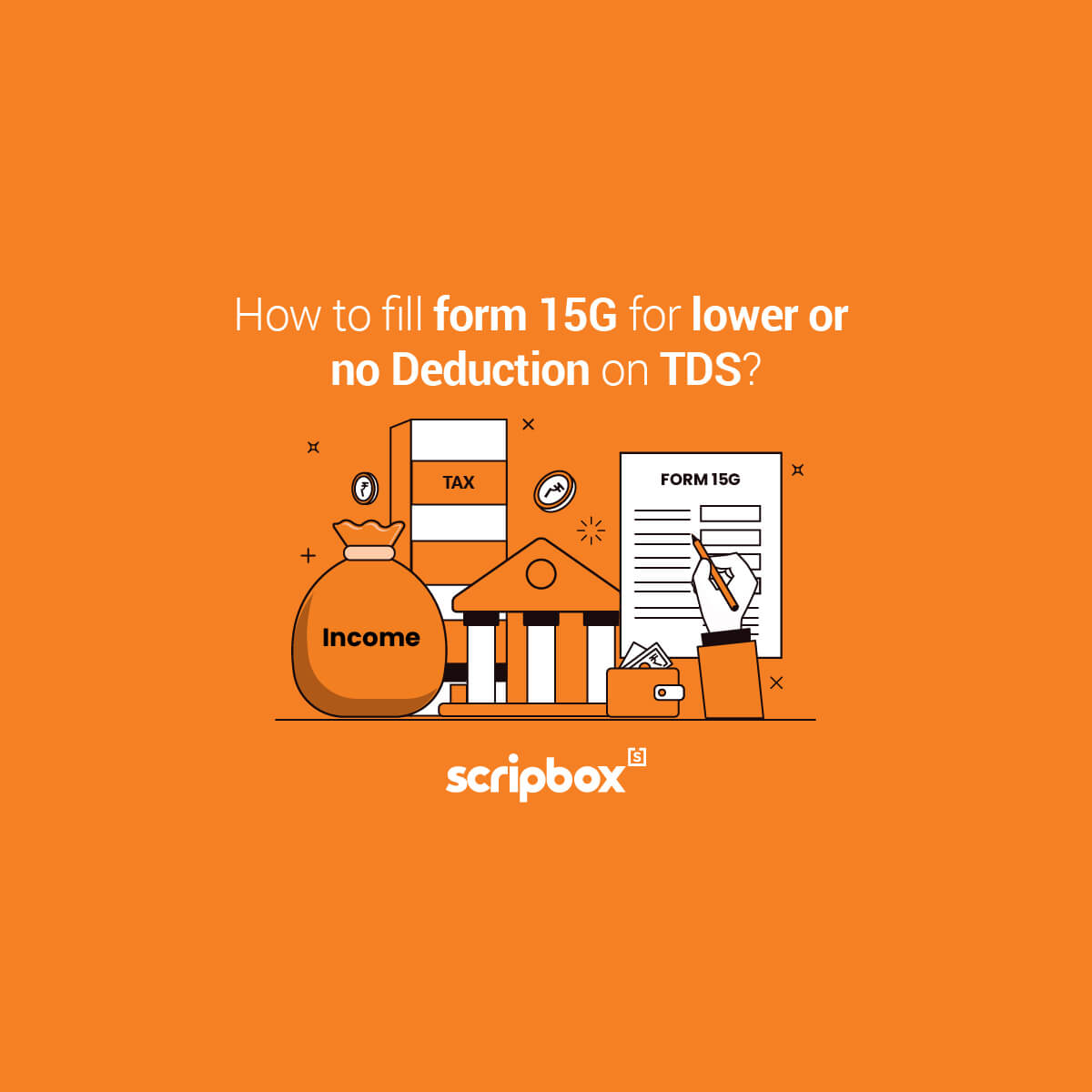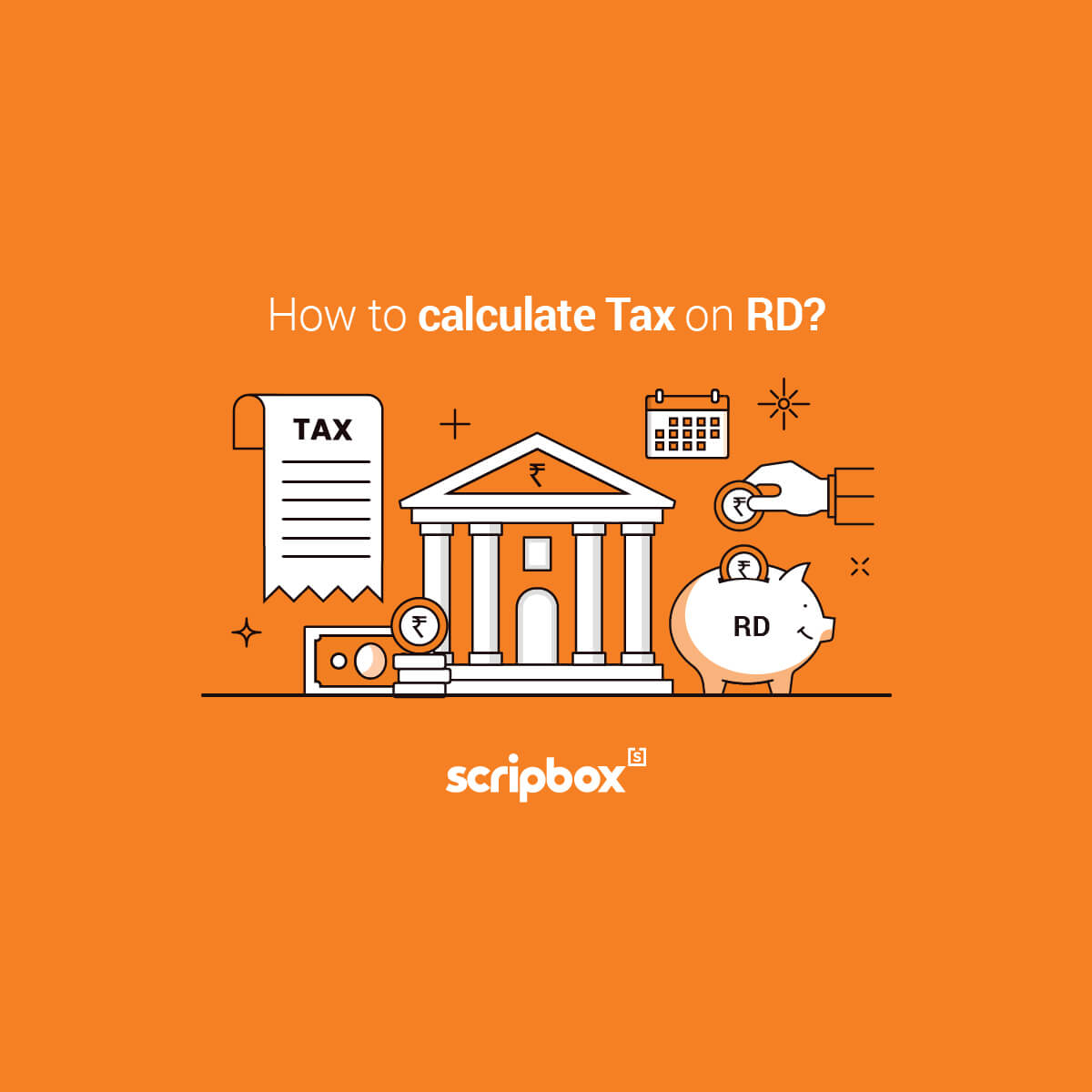Form 15G is a self-declaration form submitted by the assessee to ensure no deduction of TDS on interest income earned in the financial year. The tax on total income must be nil along with a few other conditions. You can file the Form 15G or Form 15H by logging into your internet banking account.
What is Form 15G?
TDS is applicable to various interest income a taxpayer earns during the financial year. There are many taxpayers who have an income that is eligible for TDS deduction but the total tax payable in a financial year is nil. They have to take the burden of TDS in the financial year, file the income tax return and claim an income tax refund of the TDS deduction. This a hassle for the taxpayers, especially senior citizens to file ITR and claim an income tax refund
To ensure such taxpayers are free from such hassles the income tax department introduced Form 15G and Form 15H. An eligible assessee can file Form 15G and Form 15H with the TDS deductor and ensure no TDS on interest income.
While Form 15G is for all taxpayers (excluding companies and partnership firms), Form 15H is applicable only to senior citizens. The assessee must file these forms at the beginning of the financial year. He/ she must file these forms with every person who is responsible to pay them an income and thereby deduct TDS.
To ease the entire process, many banks and financial institutions have allowed the taxpayers to file these forms online and directly from their net banking account.
Illustration of who can submit Form 15G and Form 15H
The following illustration will help you understand the eligibility under different scenarios for submitting Form 15G and Form 15H
| Age of taxpayer | 32 years | 59 years | 62 years | 66 years |
| Salary Income (Rs) | 1,90,000 | 70,000 | – | – |
| Pension Income (Rs) | – | – | 2,00,000 | 50,000 |
| Interest on Fixed Deposit (Rs) | 70,000 | 2,70,000 | 1,20,000 | 3,50,000 |
| Total Income before Deductions (Rs) | 2,60,000 | 3,40,000 | 3,20,000 | 4,00,000 |
| Deduction under section 80C (Rs) | 40,000 | 1,10,000 | 1,00,000 | 130,000 |
| Net taxable income (Rs) | 2,20,000 | 2,30,000 | 2,20,000 | 2,70,000 |
| Basic exemption limit (Rs) | 2,50,000 | 2,50,000 | 3,00,000 | 3,00,000 |
| Eligible for Form 15G | Yes | No | No | Not Eligible |
| ReasonFor Form 15G | Age is less than 60 yearsInterest Income is less than Rs 2.5 lakhTotal tax payable is NIL | Interest Income is more than Rs 2.5 lakh | Age is more than 60 years | Age is more than 60 years |
| Eligible for Form 15H | No | No | Yes | Yes |
| ReasonFor Form 15H | Assessee is not a senior citizen | Assessee is not a senior citizen | Taxpayer is a senior citizen and a resident individual Tax on total income is NIL | Assessee is a senior citizen and a resident individual Tax on total income is NIL |
Purpose for which you should submit Form 15G or Form 15H
The following are the purposes for which you should submit Form 15G or Form 15H:
- TDS on fixed deposits interest: You can submit the form 15G to banks and financial institutions to ensure no deduction of TDS.
- TDS on rent: In case your rent on the property is more than Rs 2.4 per annum, the tenant will deduct TDS. You must submit Form 15G or Form 15H in case your total taxable payable is nil. This is applicable from 1st April 2019.
- Tax deducted at source on insurance commission: Tax deducted at source is applicable if the insurance commission exceeds Rs 15000 in a financial year. An insurance agent can file Form 15G or Form 15H in case the total taxable payable is nil. This is applicable from 1st June 2017.
- TDS on post office deposits: The post offices also accept Form 15G or Form 15H. You must submit to ensure no deductions of TDS on income.
- TDS on income from corporate bonds: If your total income from corporate bonds exceeds Rs 5000 then TDS is applicable. You can submit Form 15G or Form 15H and request the financial institution for non-deduction of TDS on the interest income
- Tax deducted at source on EPF withdrawal: TDS is applicable in case you opt for a premature withdrawal of your provident fund. This is the case when you withdraw before completing 5 years of continuous service in an organization. However, TDS is applicable only if the EPF withdrawal amount exceeds Rs 50,000. Hence, you must submit Form 15H or 15G for PF withdrawal if the tax on total income is nil. Here total income must be including the EPF withdrawal amount in order to submit Form 15H or 15G for PF withdrawal.
You can read our article on Capital Gain Bonds
How to fill Form 15G?
You can download Form 15G here.
Part-1 of the Form 15G- Declaration under section 197A (1) and 197A (1A). The part-1 is to be filed by the taxpayer who is claiming certain incomes without deduction of tax at source
Part-2 of the Form 15G- The part-2 is to be filled by the deductor who is responsible for paying the income to the taxpayer who is filing the part-I of Form 15G
The following instruction will help you fill Form 15G Part-1 correctly and avoid any future hassle:
- Name of Assesse (Declarant) – Enter your name as per income tax records
- PAN of the assesse – Enter your PAN number as per your PAN card and income tax records. The declaration will be deemed to be invalid if the taxpayer fails to furnish a valid PAN number in the form.
- Status – Mention your taxpayer status of being an individual or HUF
- Previous Year – Mention the financial year for which you are submitting the form
- Residential Status – Only a resident of India can submit Form 15G. Mention your residential status as per section 6 of the income tax act, 1961
- Flat/Door/Block Number – Mention your permanent address details
- Name of Premises – Mention your permanent address details
- Road/Street/Lane – Mention your permanent address details
- Area/Locality – Mention your permanent address details
- Town/City/District – Mention your permanent address details
- State – Mention your permanent address details
- PIN – Mention your permanent address details
- Email- Provide your email address. Ensure that you mention the email address that matches up with the income tax records.
- Telephone no- mention your phone number. Ensure that the phone number matches up with the income tax records for any communications.
- (a) whether assessed to tax under the income tax act, 1961? – Mark this option as ‘Yes’ in case your income was above the taxable limit in any of the past 6 years. (b) If yes, latest assessment year for which assessed – Provide the latest assessment year in which your taxable income exceeded the basic exemption limit
Other Details
- Estimated income for which declaration is made – mention the sum of income you assume to receive in the financial year against which TDS should not be deducted.
- Estimated total income of the previous year in which income mentioned in column 16 to be included – Calculate your total income from all sources for the financial year and mention it. Here, you must include the income mentioned in point-16 above while calculating the total income.
- Details of Form 15G other than this form filed during the previous year, if any; a total number of form no 15G filed and aggregate amount of income for which form 15G filed – In case you have filed more than one Form 15G in the financial year, you need to mention all the total number of Form 15G filed. Further, also mention the total income for which Form 15G was filed.
- Details of income for which declaration is filed; Identification number of relevant investment/account etc, Nature of Income, Section under which tax is deductible, Amount of income.
- Signatures – Sign the form 15G. Remember your signature must match with income tax records. In case you are filing the form as the authorized signatory of a HUF or AOP then mention your capacity.
Forgot to submit Form 15G or Form 15H?
Many times the taxpayers forget to file Form 15G or Form 15H before the TDS deduction or let’s say on time. This situation leads to TDS deduction on the income earned by the banks or financial institutions. Here is what you can do as a resource:
- Firstly, you must know when is your income receivable and TDS deduction on the income earned. Most banks and other financial institutions deduct TDS on income every quarter. Hence, you must submit your Form 15G or Form 15H immediately with the deductor of tax deducted at source. This will ensure there is no TDS deduction for the rest of the financial year
- Once the TDS is deducted the deductor of such TDS cannot refund you the TDS amount. You can claim the excess tax paid i.e. excess TDS only filing the income tax return on or before the due date of filing the income tax return. You can always check the total TDS deducted by the tax deductor by viewing Form 26AS of the relevant assessment year.
How to download Form 15G and H?
You can follow the below steps for Form 15G Download.
- Visit the income tax website at incometaxindia.gov.in
- Go to the ‘Forms/ Downloads’ option
- Click on ‘Income Tax Forms’ from the drop-down menu
- Scroll down the page and you will find the option of Form 15G and Form 15H.
- You can download the PDF format or the fillable form.
How to fill Form 15G for PF withdrawal?
You can submit both PF withdrawal forms as well as Form 15G for non-deduction of TDS on such withdrawal online. Along with the online submission of 15G for PF withdrawal, the EPFO department also accepts offline submission. You can simply fill and submit a physical copy of the form to EPFO regional office.
To submit Form 15G online on EPFO portal, you can follow the below steps:
- Login to EPFO UAN unified portal. Enter your username, password, and captcha code.
- Go to online services
- Select ‘Claim (Form 31, Form 19, Form 10C & Form 10D)’ from the drop-down menu.
- Fill in the requisite details and verify the last 4 digits of the phone number, EPF withdrawal form will be visible.
- Here you will find an option to upload form 15G.
- Download the Form 15G from here.
- Fill Form 15G Part 1 of the form and verify all the details. Lastly, convert the filled form into PDF format.
- Lastly, you need to upload a PDF copy of the form.
Things to keep in mind while filing Form 15G and Form 15H
- Every assessee must submit Form 15G and Form 15H with a valid PAN number. In case the PAN number is valid, the deductor will deduct TDS at a rate of 20%. Hence, you should attach a copy of your PAN card along with your form
- You must ensure you receive an acknowledgment of the Form 15G and Form 15H you have submitted. The acknowledgment will serve as proof in the case of a dispute
- In every form you submit, the PAN number is mandatory. The assessing officer will always access to the information submitted to other banks on other forms in a financial year. Hence, you must always make you submit correct information.
- You have submitted Form 15G and/ or Form 15H during the financial year. Additionally, you also happen to earn a taxable income, then you must immediately inform the deductor about such taxable income. The deductor will then start deducting TDS on the income.
Who is eligible to submit Form 15G?
Each must fulfill the following conditions while submitting the Form 15G to the income tax department:
- Assessee is a resident of India
- The assessee is an individual taxpayer, Hindu undivided family HUF, or a trust. An assessee who is a company or a firm cannot submit Form 15G
- In the case of an individual taxpayer, the taxpayer is less than 60 years of age.
- The tax liability on total taxable income is nil
- The total interest income of the taxpayer is less than the basic exemption limit. The basic exemption limit for FY 2020-21 AY 2021-22 is Rs 2,50,000.
In case your income needs to be clubbed with the income of another assessee then you must not submit Form 15G. Interest income on a fixed deposit earned by a non-earning spouse or a child must be clubbed with the income of the assessee. In his case, Form 15G is not valid. The reason is that for Form 15G PAN is mandatory and TDS should be deducted in the name of the depositor only.
TDS on Interest Income
Section 194A provides for TDS on interest income at a rate of 10% on furnishing the PAN number. If you do not furnish PAN number TDS at a rate of 20% is applicable.
- TDS to be deducted if the interest paid is more than Rs 40000 and the payer is:
- a banking company to which the Banking Regulation Act, 1949 applies
- a co-operative society engaged in carrying on the business of banking
- post office (the deposit relates to any scheme framed and notified by the Central Government)
- 5,000 in any other case
- TDS to be deducted if the interest paid is more than Rs 50000 and the receiver is a senior citizen. The interest is earned on the following deposits:
- Deposits with banks;
- Deposits with post offices
- Fixed deposit schemes
- Recurring deposit schemes
Who is eligible to submit Form 15H?
Each must fulfill the following conditions while submitting the Form 15G to the income tax department:
- Assessee is a resident of India
- The assessee is an individual taxpayer.
- The tax liability on total taxable income is nil
- Assessee is more than 60 years of age i.e. a senior citizen at the time of filing the Form 15H.
Difference between Form 15G and Form 15H
| Particulars | Form 15G | Form 15H |
| Applicability | The assessee is less than 60 years of age. He/ she is not a senior citizen at the time of filing the Form 15H. | The assessee is more than 60 years of age. He/ she is a senior citizen at the time of filing the Form 15H. |
| Type of taxpayer | an individual taxpayer, Hindu undivided family HUF, or a trust. | an individual taxpayer |
| Interest Income | The total interest income of the taxpayer is less than the basic exemption limit | No such restriction. |
Where can you submit For 15G?
You can submit Form 15G or Form 15H at the following institutions or corporations to ensure no deduction of TDS by the deductor:
- Banks
- Post Offices
- Companies issuing corporate bonds
- EPFO. On the occasion of premature withdrawal of provident fund.
- To Insurance companies by insurance agents
Penalty for filing a false declaration in Form 15G
A false declaration in Form 15G in order to avoid TDS deduction may lead to penalty as well as imprisonment. It is always advisable to submit Form 15G and Form 15H only if you are eligible to claim the benefit. Section 277 of the income tax act, 1961 provides for such penalties:
If a taxpayer makes a statement under the Act or any other rules or submits false accounts or statements, he/ she shall be punishable:
- Imprisonment of more than six months and less than seven years along with fine- If the amount of tax evasion exceeds Rs 25000 due to such false statements or accounts.
- Imprisonment of more than three months and less than two years along with fine- In any other case
Information for TDS Deductors
- The income tax act requires every TDs deductor to allocate a unique identification number or UIN to every assessee who submits the Form 15G or Form 15H to the deductor.
- Every deductor file a statement of Form 15G/Form 15H on a quarterly basis
- Every deductor receiving Form 15G or Form 15H must retain the forms for 7 years.
- The Part-2 of form 15G needs to be filled by the TDS deductor and the below details must be mentioned:
- Name of the person responsible for paying- the name of the TDS deductor
- Unique Identification Number- To be provided by the deductor to each form received
- PAN of the person responsible for paying- PAN number of the deductor
- Complete Address- Address of the deductor as per income tax records
- TAN of the person responsible for paying- TAN of the deductor as per income tax records
- Email- Email ID of the deductor as per income tax records
- Telephone number (with STD Code) and Mobile Number- Details of the deductor as per income tax records
- Amount of income paid
- Date on which the declaration is received (DD/MM/YYYY)- This is the date on which the deductor receives the form
- Date on which the income has been paid/ credited (DD/MM/YYYY)
Recommended Read: Form 13 for TDS Deduction
Frequently Asked Questions
No, you don’t need to submit the Form 15G/ Form 15H to the income tax department. You need to submit Form 15G only with the person responsible for paying you the income. It is the responsibility of the TDS deductor to prepare and submit these forms to the income tax department.
No, only a resident of India can file the Form 15G and Form 15H. Hence, an NRI cannot file these forms
You can file Form 15G and Form 15H to ensure no TDS deduction on your interest income during the financial year. There is no deduction of TDS because the tax on total income is nil. This does not straight away mean that the income is not taxable. Since your income falls below the basic exemption limit hence no tax payable and lastly, no TDS due to filing of Form 15G or Form 15H.
Yes, you must submit one Form 15G/ Form 15H at each branch of the bank. Each branch from which you receive interest income. However, the bank will deduct TDS only if the total interest income from all the branches exceeds Rs 10,000 during the financial year.
Related Articles
- Confused if your portfolio is performing right enough to meet your goals?
- How long have you been investing in mutual funds?
- What is your current portfolio size?
- What is your approximate annual household income?
- Your profile does not qualify for a call with a Financial Expert.
- What is Form 15G?
- Illustration of who can submit Form 15G and Form 15H
- Purpose for which you should submit Form 15G or Form 15H
- How to fill Form 15G?
- Forgot to submit Form 15G or Form 15H?
- How to download Form 15G and H?
- How to fill Form 15G for PF withdrawal?
- Things to keep in mind while filing Form 15G and Form 15H
- Who is eligible to submit Form 15G?
- TDS on Interest Income
- Who is eligible to submit Form 15H?
- Difference between Form 15G and Form 15H
- Where can you submit For 15G?
- Penalty for filing a false declaration in Form 15G
- Information for TDS Deductors
- Frequently Asked Questions
























Show comments